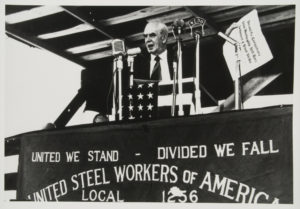What is “Codetermination?”
Ever heard of “codetermination”? In industrial relations, the term refers to a practice used in Europe, most famously in Germany, to ensure that firms operate for the common good of owners, managers and workers alike. You see, German law sets aside seats for workers on the corporate boards of German corporations. The practice ensures that worker viewpoints get a hearing at the highest levels, where corporate decisions are made, and has a hidden Catholic history. And as Matt Mazewski points out in his recent Commonweal Article “Bringing the Workers on Board”, presidential hopeful Sen. Elizabeth Warren wants to bring codetermination to the United States. Under her proposal, 40% of the seats on a corporate board would be set aside for elected employee representatives.
Joint labor-management control of work has been a theme of Catholic Social Teaching from its beginning in Rerum Novarum, which promoted “workingmen’s unions… consisting either of workmen alone, or of workmen and employers together” in the manner of the medieval guilds [49]. The teaching was further elaborated in Quadragesimo Anno, in which Pope Pius XI advised that “so far as is possible, the work-contract be somewhat modified by a partnership-contract [69].” Mazewski reviews this history in the concrete case of Germany and its institutions.
Indeed, he concludes,
Given the support for some form of codetermination or worker ownership evident in the past century of papal writings, it is striking that the topic is hardly ever mentioned by Catholic labor activists or by the bishops—including the current Bishop of Rome. Most discussions of the church’s views on labor and the rights of workers begin and end with unions. A search of the website for the Catholic Labor Network, which strives to advance workers’ rights and to spread awareness about Catholic teaching on the issue, returns nearly two hundred mentions of the word “union” but not a single instance of “codetermination” or “worker ownership.”

Ouch! (In our defense, the word “codetermination” does not appear in the Encyclicals or the Compendium of the Social Doctrine of the Church either.) But we agree it’s a fruitful topic — and although not referenced in Bringing the Workers on Board, America had its own brief flirtation with codetermination. Starting with the National Recovery Association codes of the early 1930s to the National War Labor Board of the early 1940s, the mid-20th century saw a series of experiments in joint labor-management regulation of economic production. Phil Murray, the devoutly Catholic leader of the Congress of Industrial Organizations (CIO) and the Steelworkers Union – inspired by Quadragesimo Anno — advocated vigorously for developing a permanent system of Industrial Councils in America jointly led by unions and captains of industry. The idea fell out of favor in the postwar years, however, even as Germany developed its modern system of codetermination.
One might say there are traces of codetermination to be found in the construction unions, where joint labor-management trusts still operate the apprenticeship programs, hiring halls, health insurance programs and pensions for the union sector of this vital industry. But I hope that Senator Warren’s proposal leads to more discussions of this excellent practice – and if it does, you’ll see more of it in the Catholic Labor Network blog!

Kaiser Permanente has had in place a Labor-Management Partnership (LMP) that began in the late 1990’s. It effectively brings together both sides and creates an environment where labor has a voice and contributes to the overall health (not pun intended) of the organization. While not perfect it is a far cry from the traditional relationships in our country. It’s worth looking at:-)